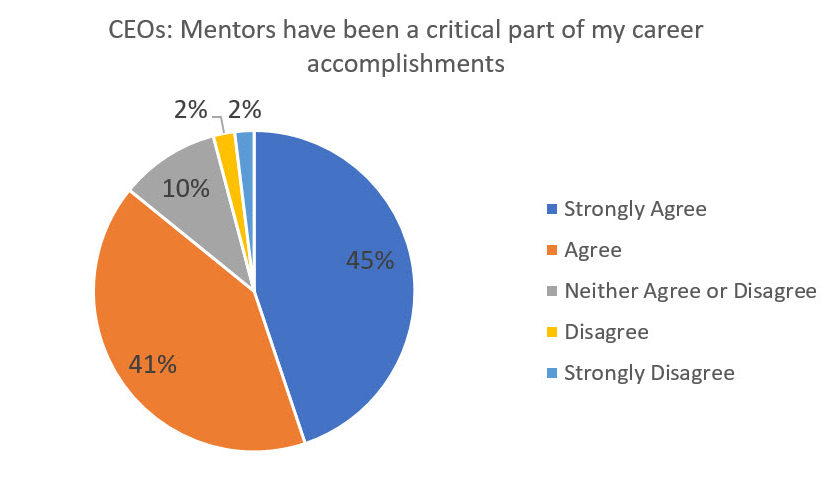Leadership mentoring matters for CEOs

Even the most successful CEOs and business leaders say that somewhere along the way, they had a mentor who made all the difference.
It’s true that most leaders would tell you they have relied on mentors throughout their career.
In fact, among the 1,348 CEOs surveyed in the August 2020 Vistage CEO Confidence Index survey, 86% agreed that mentors have been a critical part of their career accomplishments. Without mentors, CEOs have to “figure it out” on their own or they have to adopt a trial-and-error approach to a previously solved problem, which means reinventing the wheel.

Source: August 2020 Vistage CEO Confidence Index survey
What makes a good leadership mentor?
What does effective mentorship in leadership look like? The power of mentors is their ability to apply their experience, knowledge, and perspectives to another person’s situation — without pushing an agenda — and provide them with guidance and direction.
Mentors listen to their mentees without judgment or bias and provide a perspective on the issue or decision they’re facing. In some cases, the issue is as simple as how to manage career development; in other cases, it’s as complex as how to handle a sensitive workplace conflict or make an important decision about strategic growth. A mentor may provide lifelong direction, or they may offer advice on how to just get through the next week.
Types of leadership mentors
Traditional mentoring falls into three broad categories:
Internal mentors
Formal internal mentoring programs are often part of an organization’s employee development program. In the August 2020 Vistage Confidence Index survey, 62% of CEOs said they were currently mentoring someone professionally.
Typically, mentors are developed informally in a company, with a senior leader taking an emerging leader under their wing. These internal mentors can offer mentees perspective on how to explore career choices, navigate delicate political situations or adapt to a shifting culture. They can offer guidance on how to make key decisions and how to bring those decisions to life inside the organization.
External mentors
Outside the organization, mentors play an important role in guiding leaders. Not bound by the constraints or expectations of an organization, external mentors are often unbiased and free to offer objective insights on career decisions. Whereas an internal mentor may have a company’s interests in the back of their mind, external mentors can focus on the individual’s interests when giving advice. They can provide objective support on business issues and, potentially, on life issues that the mentee may not want to discuss with someone in their organization. External managers can supply a sounding board for ideas and aspirations while injecting a dose of reality into discussions.
Community mentors
Community mentors are typically people who seek to give back or contribute to the lives of others. We see one example of this in the men and women who coach sports teams in their local schools or recreation centers. Another example is scouting, where community leaders work with young people to develop a sense of civic pride and responsibility while learning important life skills. Community centers, junior achievement programs and Enactus also create environments where more experienced people work with younger ones to help them make better decisions in their lives.
CEOs can become community mentors by volunteering their company’s expertise to serve the community. For example, a financial planning firm can offer free 1-1 advisor hours at a community center or give public town hall presentations on topics such as budgeting, managing debt, or retirement planning. A computer repair business can offer DIY clinics so that members of the community can learn technology tips and tricks. Becoming a community mentor is an opportunity for small and midsize businesses to practice corporate social responsibility in their localities.
Leadership mentoring myths dispelled
Mentors should be older than their mentees
What qualifies someone as a mentor is their experience with and knowledge of an issue, irrespective of their age. For example, your lawyer can mentor you on legal issues even if they’re younger than you, as they bring experience, insight and perspective to scenarios such as buying a house or preparing a trust. Similarly, a financial advisor can mentor you through critical decisions about financial investments or retirement savings, regardless of their age.
Mentors should be older than their mentees
Mentors don’t have to come from a specific background either. Mentoring happens when someone shares their experiences, insights and perspectives with someone else, which means that anyone could theoretically be mentored by anyone else — assuming there is trust and respect on both sides.
Consider the example of a CEO who has never faced a real cash-flow issue before. They might seek the advice of other CEOs who have dealt with this problem before to learn from their mistakes or leverage their perspective. Or they might seek the advice of an accountant with cash-flow management experience.
CEOs must try on their own
Most importantly, CEOs shouldn’t try to figure out their problem without a mentor, or assume they’ll get it right the first time as there are no CEO savants.
Three essential elements of leadership mentoring
1. Trust
Trust is essential as a filter, as it helps you know if a mentor is well intentioned. A strong mentor recognizes strengths and potential in others and has no ulterior motives in providing coaching. Similarly the mentee has to be someone who can demonstrate decorum and good judgment as mentoring may expose them to sensitive information.
2. Respect
Respect is essential for ensuring your mentor has credibility on the issue or topic. There are a lot of people who are more than happy to espouse their opinion on what you should or shouldn’t do. However, it’s important to trust and respect the person offering their perspective, as it will influence your judgment when making a decision.
3. Context
The third element has to do with context. Sourcing information from a book or website is not equal to mentoring; it’s research. You may gain meaningful information, but that information will lack insight and won’t necessarily connect dots. You may gain knowledge that improves your judgment, but that knowledge won’t expand your perspective. By contrast, mentors rely on context to provide a perspective — a view that accounts for someone’s specific circumstances, alternatives, goals and objectives. And perspective is what makes mentoring so powerful.
Mentors help executive leaders make optimized decisions
This connects to the Vistage concept of optimized decision-making. To optimize your decision-making, you need to accept the input of someone you trust and respect. Optimized decision-making is a blend of your instincts (how you feel about a decision), judgment (what you think about the decision) and perspectives (what you gain from the people and resources you trust and respect). By expanding and incorporating the perspectives of mentors you trust, you improve your judgment and refine your instincts. This leads to better decision-making, as no one can function successfully as an island.
As a leader, you have your own path to follow and mountains to climb. But others have gone in your direction before. By accepting the perspectives of people you trust and respect, you can get on a faster path to your goals and objectives, both professionally and personally. You are never too old to be mentored or too young to mentor. You just need trust, respect and the humility to recognize that no one has a monopoly on knowledge. Rather, knowledge is something to accept — and something to share.
Related content
Category: Personal Development
Tags: CEO, Leadership, Mentoring

